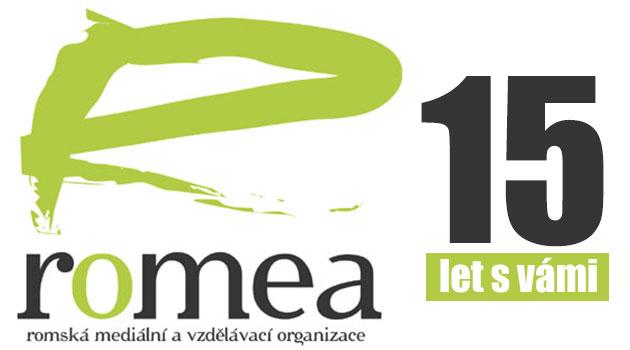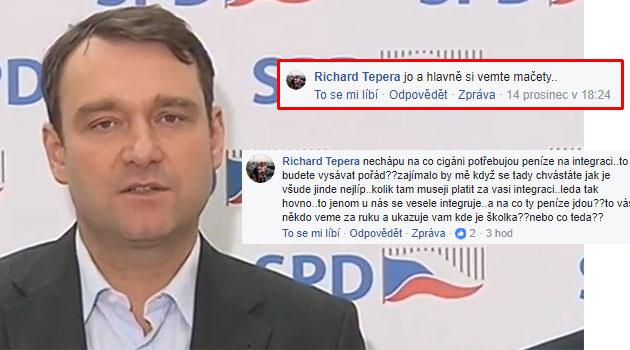2003
On New Year’s Eve, 31 December 2002, the ROMEA civic association was officially registered. Its establishment was initiated in the autumn of 2002 by five friends (who were young in those days): Jarmila Balážová, Zdeněk Ryšavý, Soňa Kalejová, Vojta Lavička and David Pešta.
On 24 February 2003 ROMEA published the inaugural issue of Romano voďi magazine. That same month ROMEA launched its online news server, Romea.cz.
News reporting through text was soon augmented by video reportages that were focused on culture in the beginning. The musical program show “Čhinger Phager” was created and the basis for what would later become the first-ever Romani Internet television channel, ROMEA TV, was established.
2004
The organization developed and expanded from the media field into education. The educational website skola.romea.cz was established, the first year of the literary competition “Minorities among Us” was held, which continued regularly until 2011, and we organized discussions in the schools.
2005
On 8 December 2005 ROMEA held a commemorative evening in the Marble Hall at Lucerna Palace to honor the memory of the late Milena Hübschmannová, who pioneered Romani Studies at Charles University in Prague. ROMEA would award a literary prize in her name twice in the coming years.
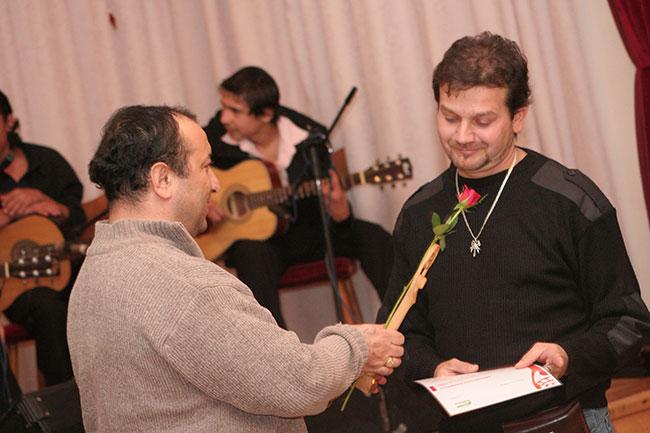
That year marked the first time we attempted raising money from individual donors, joining the COOLHELP project and selling what were very popular black bracelets. We manage to sell 12 000 of them.
2006
ROMEA expands its activities to include the social arena. We joined the EQUAL project together with the Slovo 21 organization.
We opened an educational and Internet center to aid Romani people with finding jobs and we continued that service until 2015, when we launched our first course for young Romani journalists. In October 2006 our staffer answered the first-ever phone call to our anti-discrimination hotline, which we ran until 2015.
AWARDS GIVEN TO THE ROMEA ORGANIZATION
2006 – Stříbrná Effie for best social advertisement
2010 – Gypsy Spirit Award in the category of Organization
2012 – Alice Garrigue Masaryk Award from the Embassy of the United States of America
2013 – Romea.cz reporter František Kostlán wins the Roma Spirit Award in the category of Media; Romea.cz comes in ninth place in the prestigious Křišťálová Lupa competition for best use of the Czech Internet
2015 – Romea.cz head Zdeněk Ryšavý wins the Roma Spirit Award in the category of Media
2016 – European Roma Spirit Award for Romea.cz in the category of Media
2017 – Bravery Award from the Anticorruption Endowment
2007
The independent Internet television station ROMEA TV is launched, a Romani channel where several continual programs can be followed, such as the Hiri program or the Terno youth program, which was moderated by 17-year-old Tomáš Bystrý. Today he is an editor at the Radiožurnál radio station.
In July 2007 ROMEA filed a report of a suspected crime against the local politician Liana Janáčková, who was caught on tape speaking about the “excessive reproduction of gypsies” whom she said she would like to put “behind an electrified fence”. ROMEA also joined another report of a suspected crime filed against the local politician Jiří Čunek, whose antigypsyism shot him to national prominence.
2008
ROMEA launches the campaign called “Do Something!” (Udělej něco! – Ker vareso!), focusing on Romani people themselves and motivating them by showing them positive Romani role models and emphasizing the essential initiative necessary to achievement and engagement. Based on the Janáčková scandal, we began monitoring cases of discrimination, illegality and racism as well as monitoring demonstrations against Romani people.
We also focused on monitoring the Czech media. Our media watchdog project was created and grew stronger in the years to come.
2009
Another groundbreaking year of new activities. For the next three years we published a magazine for youth, Romano voďori, we expanded our educational server, and we begin our work on a methodological guide for primary and secondary school educators on the subject of Romani history and literature which would eventually be published in 2012.
We first broadcast our “10-Minute Insight” program online in 2009. This special talk show has been moderated over the years by Romani journalists Tomáš Bystrý, Jarmila Balážová, Robert Ferko and Richard Samko.
2010
ROMEA began administering a scholarship program for Romani college and university students. The main aim of the program is, through scholarships, to increase the educational attainment of members of the Romani minority in tertiary education and to desegregate the education system in the Czech Republic.
2011
We begin implementing the “Romani Mentor” project, the main aim of which is to contribute to the integration of disadvantaged children by implementing recreational activities for them from the areas of arts and culture (and later, from sports) in the schools.
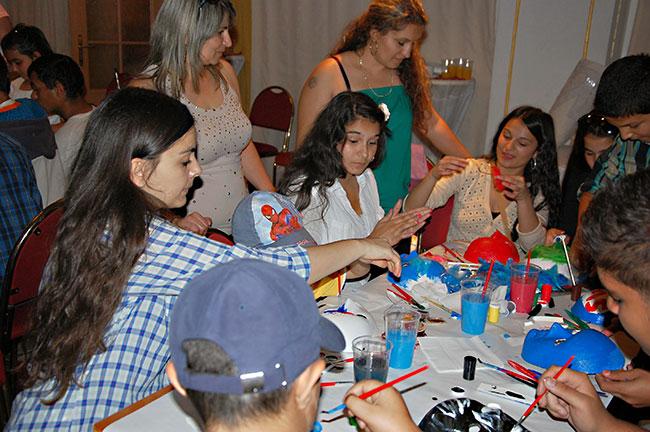
2012
ROMEA experienced significant success with its media watchdog project in 2012. The Czech tabloid Parlamentní listy fabricated a fake news report with an anti-Romani bent which was reprinted by most other media outlets as headline news without fact-checking it.
News server Romea.cz investigated and revealed the editorial and journalistic errors. Some media outlets apologized for publishing the fake news, and the editors of Romea.cz had the pleasure of reading several opinions by Czech media analysts praising their work, such as Jindřich Šídlo, who said: “This case belongs in journalism textbooks – and if possible, starting right this semester.”
2013
As part of a project called “Europe: A Romani Homeland”, ROMEA and the organization Transitions Online jointly produced a documentary film called “Because There Is Hope“, which tells the story of Jožka Miker, a Romani activist associated with the Konexe civic association.
2014
The media watchdog project was in full swing, focused on correcting the biased image of Romani people in the Czech media. ROMEA published media analyses and demonstrated to readers how Romani people are being unfairly depicted.
In September, in collaboration with the Higher School of Journalism in Prague, ROMEA held a media training focused on practical skills in communicating with different kinds of media. We produced several films: “In the Shadow of the Romani Holocaust” (Ve stínu holocaustu Romů), about the concentration camp for Romani people at Lety u Písku, and “Fulfilled Dream” (Splněný sen), dedicated to Romani Internet radio and the music group Gipsy Kubo.
2015
News server Romea.cz, for the first time since it was created, was led for a year by an “external” journalist, Michal Komárek, thanks to ROMEA’s success in the Vodafone Foundation’s “One Year Differently” program. Komárek focused the news server’s reporting on the area of education and also focused on bigger promotion of the news server’s content into big mainstream media outlets, as well as running two practical seminars about the media depiction of Romani people for students at the College of Media and Journalism.
2016
This was another breakthrough year in which ROMEA launched its own comprehensive scholarship program for Romani students of higher vocational schools and secondary schools. In November of that year we sent our first scholarships to almost 60 students.
In 2017 the program sponsored 86 students. We organized Romani student meetings for them and have invested hundreds of thousands of crowns into personal development and tutoring for them.
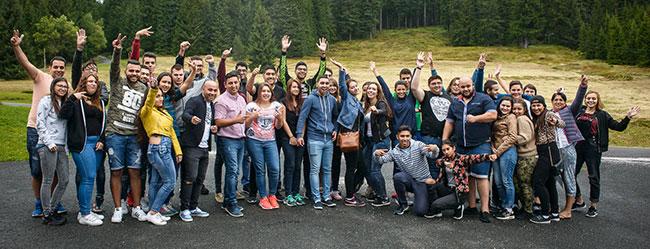
We also began the “Romani Memory” project. Its aim is to familiarize the broader public with the history of Romani people by aiding Romani eyewitnesses to the events of the 20th century with telling their personal stories.
2017
The Internet television station ROMEA TV took another step forward last year. We focused on live broadcasts of press conferences and various other events.
ROMEA has trained more Romani journalists who will contribute to the television broadcasts this year. We also became one of a very few organizations involved with Romani subject matter to focus on individual donors.
During our first-ever fundraising campaign in September we raised more than CZK 120 000 [EUR 4 700] and 65 % of our donors were Romani community members. In our following fundraising campaign, “THEY WANT TO GAS THEM, WE WANT TO SEND THEM TO SCHOOL“, we raised CZK 460 000 [EUR 18 000].
